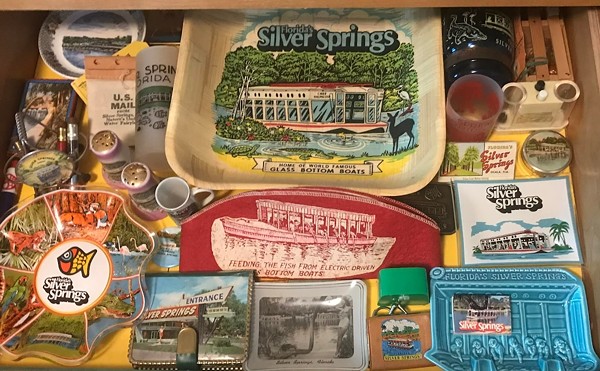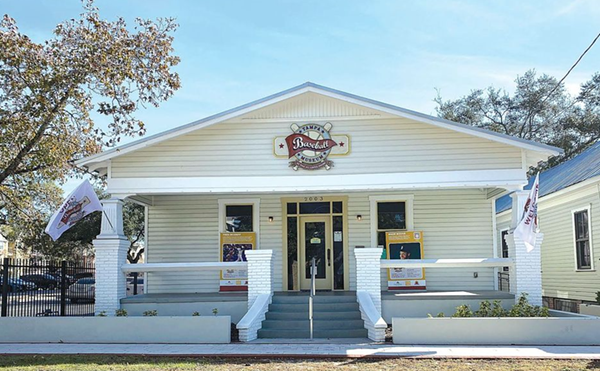
Who drowns a baby reindeer? Writers are animals!
There’s a fairly worn out trope about writers and their Google search histories. There are many coffee mugs with variations of: “I’m a novelist. If I die, delete my search history.” In my own experience I’ve found myself searching French extradition laws, whether you can carry an antique firearm on a plane and the organizational structure of various international law enforcement organizations. If I’m ever suspected of a crime related to any of these things, my search history should prove quite useful to the prosecution. My research also sends me down some dubious roads, reading books claiming that Hitler didn’t die in the Fuhrerbunker (it was not White Supremacist Lit, but the cover was ominous) and more recently WITSEC, Inside the Witness Protection Program. That’s a fun one to be seen reading on the beach. Still, it's not as bad as a certain Creative Loafing editor I know — she may or may not be the editor of this section — who, while working on her book, emailed the county medical examiner, thus entering her query into the public record, asking if it was legal to dump a body in the Fenholloway River (editor's note: The answer is complicated. It's sort of legal).
This brings me to my last blog post. I was talking about editing and not being afraid to cut characters you love, and omit passages you spent days writing. There’s a writing cliché about this, but for the life of me, I could not think of it at the time. I tried Googling it a half dozen different ways, but it was like one of those words that I am so bad at spelling that I can’t even get close enough for spellcheck to figure it out for me (such as “hors d’oeuvres,” I usually just spell it a-p-p-e-t-i-z-e-r.)
So instead of using the elusive cliché, I just didn’t go there.
Then, later I was talking to my brilliant wife (who I gave a hard time in my last post for not reading multiple drafts of my book) and she knew the phrase immediately.
"You mean, 'Don’t be afraid to kill your darlings?'" she said after about .08 seconds of thought. Bingo. Meaning, don’t be afraid to cut words that you thought were brilliant, characters you wish were real, and scenes you love. What does my search history say instead of “kill your darlings”?
Try:
“kill the baby”
“drown the baby”
“who said drown the baby?”
…And a half dozen other variations that brought me a long list of horrible news stories, but nothing leading me to “Don’t be afraid to kill your darlings.” So, yes, my search history is messed up.

Pretty sure that baby killing tree isn't native to Florida.
Let me give you an example of one such killing, preceded by merciless torture. The first novel I wrote (but never published) had a great concept: Eager young Wall Street kid takes a business trip/vacation with his girlfriend to Switzerland. Things suddenly go south with the girl and he meets a gregarious Latin American man on an adrenaline tour. Gregarious Latin American goes splat in a BASE jumping mishap and it turns out, his despot father has shady dealing’s our protagonists bank. Suspicion surrounds our guy. I still love that premise.
The first darling I killed was about 15,000 words at the end of the book. Then, a tidy 65,000 word novel ballooned to 120,000 as our hero found himself in Central America with his Swiss Miss love interest. The story was great. The mechanics were a mess. That "darling" — a solid year’s worth of work — suffered from stabbing edits, massive hemorrhaging rewrites and ultimately, euthanized. But you know what? Killing that darling was the best learning experience I ever had as a writer. It set me up for my next novel (4.6/5 stars on Amazon) and a sequel that I’m excited to be editing.
This is how you get started. You might be writing something now — ahem, you’d better be writing something now — and wondering, “Is this any good?” Maybe not. It may end up in the circular file. But eventually, the experience of writing (which if you don’t enjoy it, just stop) becomes the educational foundation you need to write something that speaks to people. Whether your audience consists of deep thinking Literature (with a capital L) lovers, or people dashing to catch a plane and needing something to get them to Denver, few authors hit a home run in their first trip to the plate.
Now that your head is spinning with metaphors, get back to work.
 By day Jonathan Kile is a peddler of petroleum products, navigating a Glengarry Glen Ross landscape of cutthroat sales. By night he assumes the identity of novelist and child-wrangler. Jonathan’s first published novel
The Grandfather Clock
is available on Amazon - for 99 cents! He's writing his second and third novels, blogging at
Well-Oiled Writer
and cursing his editor. You can email him at
[email protected]
.
By day Jonathan Kile is a peddler of petroleum products, navigating a Glengarry Glen Ross landscape of cutthroat sales. By night he assumes the identity of novelist and child-wrangler. Jonathan’s first published novel
The Grandfather Clock
is available on Amazon - for 99 cents! He's writing his second and third novels, blogging at
Well-Oiled Writer
and cursing his editor. You can email him at
[email protected]
.


















